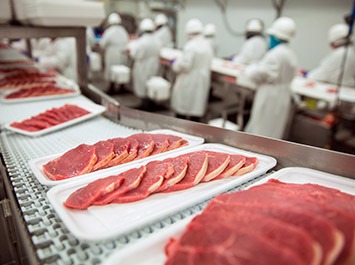
Implementation of warehouse and production management systems for the food industry
5 November 2020
The food sector, compared to other sectors of the economy, is characterized by a very high level of employment and turnover as well as, interestingly, much lower levels of innovativeness. Therefore, the use of new technologies is an opportunity to develop and gain a competitive advantage.
Efficient warehouse management
The food industry is very demanding, especially when it comes to fresh food production. If food is to meet the highest standards, it has to be stored properly.
That is why, for one of our customers, we have implemented a system to manage automatic and manually operated warehouses, meeting GMP standards for the storage and handling of fresh products.
This solution allows for:
- improvement in the use of the warehouse space,
- efficient identification of bottlenecks and improvement of process efficiency,
- immediate response to changing production requirements,
- dynamic change of parameters of warehouse and crane utilization – depending on current needs,
- a simple collection of information about the movements of individual products to identify the whole process,
- automatic sending of warnings and alerts regarding device statuses and possible product movement errors,
- instant detection of defective products.
The software enables the customer to control their inventory and the processes of receiving and sending goods, as well as to effectively manage changes in transport routes, based on current workloads. It also ensures a better flow of products between warehouses and production lines and simplifies the monitoring of all production equipment.
The warehouse management system implemented by us has significantly streamlined the daily work of our client. It made it possible to load or unload 500kg of meat per minute with just one crane and reduce the time of unloading of products in the warehouse to less than 5 seconds from the moment of request approval by SAP.
Production optimization
Optimizing production is also a major challenge for the food industry. Many companies are thinking about ways to increase the safety and efficiency of the production process while maintaining its high quality and full compliance with the legal requirements and customer needs.
Responding to these challenges, as a part of cooperation in the field of software development, we have also implemented a second system for the same customer, which facilitates the implementation and control of production.
The MES class system implemented by us, which controls production lines, makes the following possible:
- automation of production processes, thanks to continuous production control and efficient reaction to encountered problems,
- minimizing the risk of human error by standardizing processes,
- controlling performance and quality of work by providing KPIs in the form of built-in reports,
- Reducing the number of paper documents by using digital media.
Its use ensures that the enterprise can deal efficiently with any production line downtime, easily calculate the key performance indicator, generate product specifications, and provide valuable reports to operators, team leaders and managers.
Thanks to the application of the dedicated MES class system, our customer currently uses 200 production lines. As many as 120 meat trays pass through each of them per minute, which in practice means that more than 2 tons of meat per hour is processed through each line.
The implementation of warehouse and production management systems in the food industry makes it possible to significantly increase the efficiency of work and optimize its costs. Thanks to such solutions, companies become more flexible and consequently can better respond to market needs, increasing their profits.
back